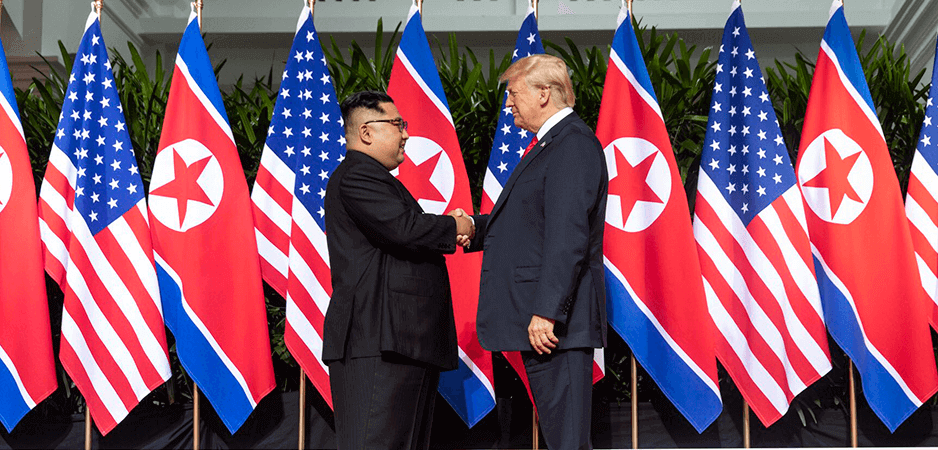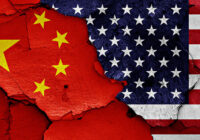This former CIA official wasn’t happy about seeing the US and North Korea flags alongside each other in the Trump-Kim photo op.
Following Donald Trump’s historic summit with Kim Jong-un, The Hill quotes former CIA Chief of Staff Jeremy Bash who was less impressed by the event itself than by the fact that the American flag was displayed alongside the North Korean flag. “[S]eeing the American flags along with the [North Korean] flags as the backdrop for that handshake is really jarring, actually, to see, to witness,” he said. “In fact, I would say it’s somewhat disgusting. It is actually a debasement of the American flag.”
Here is today’s 3D definition:
Disgusting:
1) Inducing revulsion, sickening. Used to express a physical reaction to food or drink that assaults the sense of taste or smell, or to signal a moral reaction to particularly offensive and antisocial acts
2) Producing a physical sensation of nausea in American patriots when a sacred object (the flag) appears in the vicinity of another object deemed to be unworthy of the moral purity the flag represents
Contextual note
Bash uses three separate words to describe the extent of the offense: jarring, disgusting and debasement. Jarring suggests an intellectual reaction, a logical disconnect. Disgusting suggests a physiological reaction, like nausea. And debasing suggests moral judgment. Bash’s criticism is thorough. The grounds for condemnation are overwhelming.
The context he describes might jar the reader. He accepts the shaking of what he would probably describe as the contaminated hand of Kim Jong-un, but reacts with strong emotion to what he calls “the backdrop.” The sin is not in the act but in the setting. He sees the American flag as so sacred that the human gesture of handshaking to seal a political relationship becomes trivial.
In reality, he and other critics of Trump’s policy of overture — at a loss to frame or possibly understand the politics behind it — object to the act but are using the flag as a convenient metonymy for their fear of dealing with the “other.” And nothing is more convenient than the flag, to which all Americans, from their youngest age, pledge allegiance.
Historical note
In February, citing an incident in which Olympian skier Shaun White inadvertently allowed the flag to touch the ground, The Daily Devil’s Dictionary defined “US flag” as: “An organism or living thing that is fearful of contamination through contact with the ground.” Bash helps us to understand that it may be possible to defile the flag even without the kind of direct physical contact that occurs when a flag touches the ground. Perhaps Bash imagines that the invisible chemicals secreted by the North Korean flag produce a similar polluting effect.
HISTORY. #SingaporeSummit pic.twitter.com/XF3GNzzBui
— Dan Scavino Jr. (@Scavino45) June 12, 2018
No US president since perhaps John F. Kennedy has managed to inspire the kind of loyalty that the notion of “allegiance” connotes. Popular presidents such as Franklin D. Roosevelt, Harry Truman and Dwight Eisenhower — trusted by wide swaths of the population — were at times subjected to strong criticism from their political opponents. But even when the debate became bitter, the nation remained psychologically united behind its leaders, accepting their policies with very little serious questioning.
Things changed radically with Lyndon Johnson and Richard Nixon, both forced out of office because of their actions. (Johnson, reviled for his policy in Vietnam, withdrew from the race for a second term; Nixon bailed after the Watergate scandal gained momentum.) From that moment the symbolic role of the flag, already iconic, began to take on greater importance. After 9/11, the one thing every politician agrees on and saw as the unique factor of national unity was the flag. Overnight, from the Atlantic to the Pacific, the nation became an ocean of flags: in front yards, on the antennae of cars, on lapels and other personal objects.
The “stars and stripes” has thus become, for many people, the only remaining means of encouraging or enforcing the notion of unity. The final irony of this display of “Old Glory” alongside the flag of North Korea that so disgusted Bash may be found in the emotional reaction of some people who should normally be considered Trump’s supporters. Some have compared their disgust “to the conservative disdain for African-American athletes kneeling during the national anthem,” a theme Trump himself exploited to the hilt. So, Trump turns out to be one of the “sons of bitches” who failed to respect the flag.
At the end of the day, it may be wise to recognize that a flag is a fragile object, particularly when the job people are asking it to do is to hold together a declining empire.
*[In the age of Oscar Wilde and Mark Twain, another American wit, the journalist Ambrose Bierce, produced a series of satirical definitions of commonly used terms, throwing light on their hidden meanings in real discourse. Bierce eventually collected and published them as a book, The Devil’s Dictionary, in 1911. We have shamelessly appropriated his title in the interest of continuing his wholesome pedagogical effort to enlighten generations of readers of the news.]
The views expressed in this article are the author’s own and do not necessarily reflect Fair Observer’s editorial policy.
Photo Credit: Dan Scavino Jr.
Support Fair Observer
We rely on your support for our independence, diversity and quality.
For more than 10 years, Fair Observer has been free, fair and independent. No billionaire owns us, no advertisers control us. We are a reader-supported nonprofit. Unlike many other publications, we keep our content free for readers regardless of where they live or whether they can afford to pay. We have no paywalls and no ads.
In the post-truth era of fake news, echo chambers and filter bubbles, we publish a plurality of perspectives from around the world. Anyone can publish with us, but everyone goes through a rigorous editorial process. So, you get fact-checked, well-reasoned content instead of noise.
We publish 2,500+ voices from 90+ countries. We also conduct education and training programs
on subjects ranging from digital media and journalism to writing and critical thinking. This
doesn’t come cheap. Servers, editors, trainers and web developers cost
money.
Please consider supporting us on a regular basis as a recurring donor or a
sustaining member.
Will you support FO’s journalism?
We rely on your support for our independence, diversity and quality.






